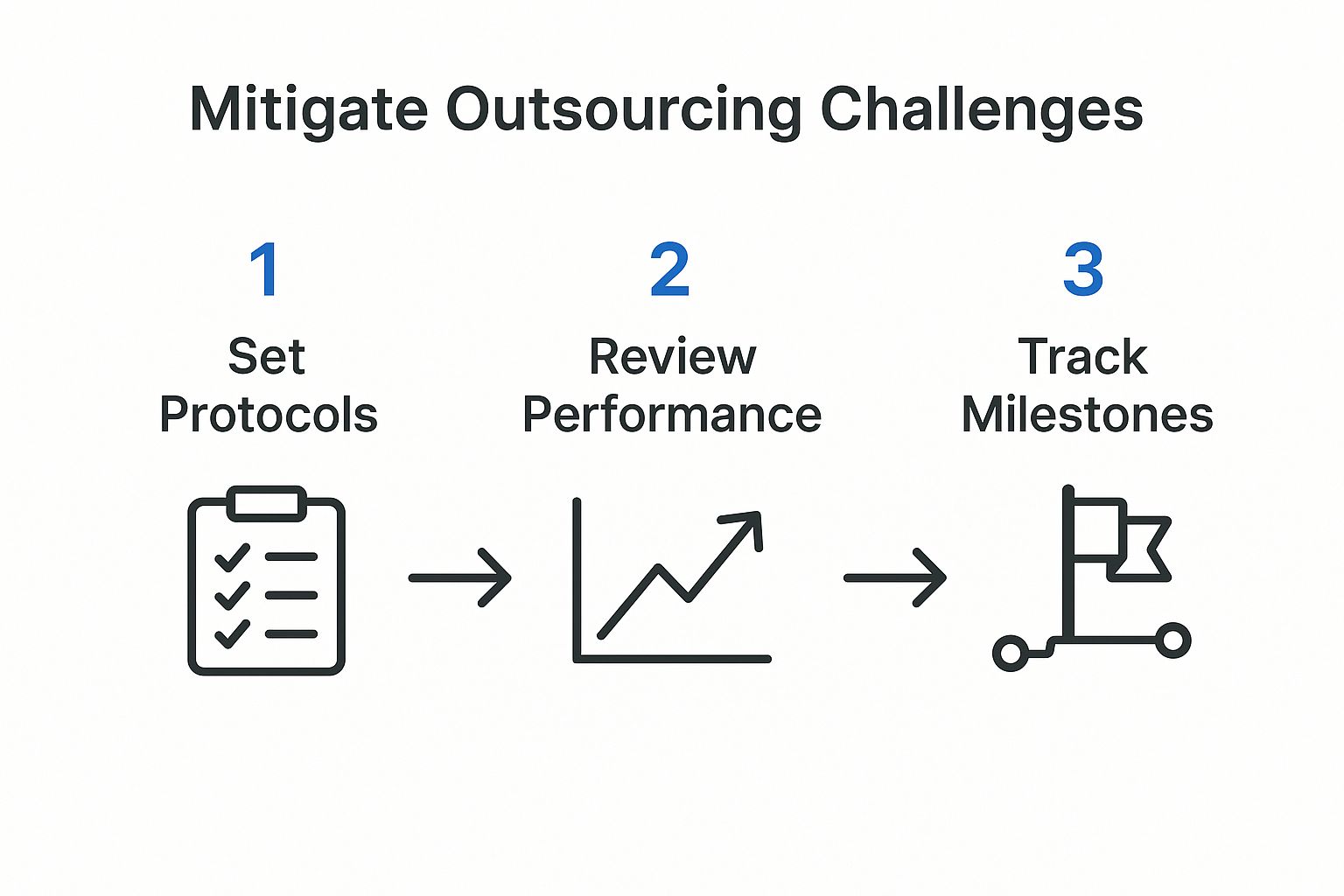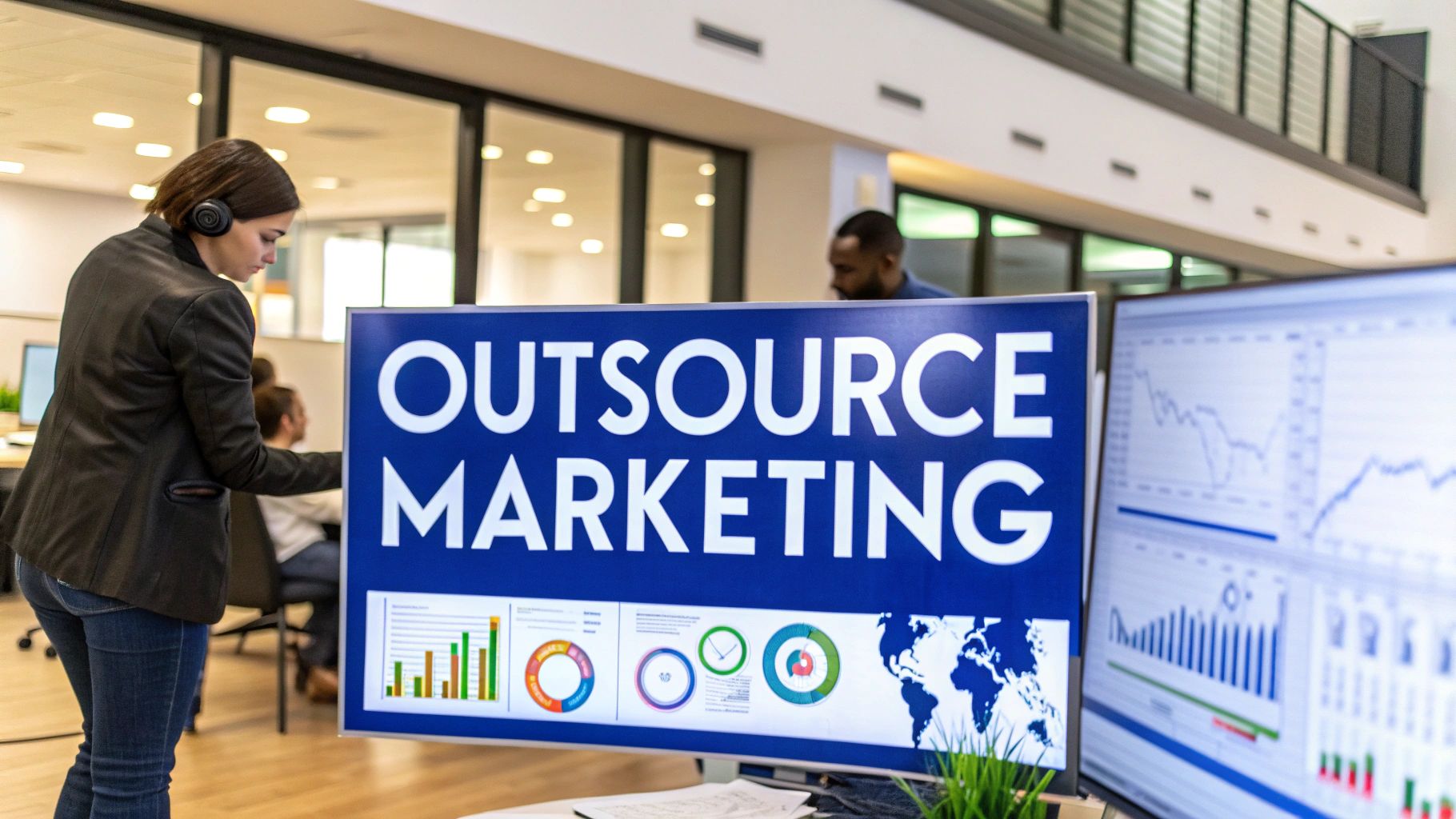Handing over your digital marketing isn't just about getting tasks off your plate. It’s a serious strategic move to tap into a reservoir of specialised skills and scale your business in a way that would be impossible on your own. For many UK businesses, this is the secret sauce for hitting those ambitious growth targets.
Why Smart Businesses Outsource Digital Marketing
The idea of outsourcing your marketing can feel like a huge step, especially if you're used to keeping things close to your chest. In many small to medium-sized businesses, marketing is a jumble of tasks juggled by a small team or, quite often, the founder themselves. But as your company grows, that jack-of-all-trades approach quickly becomes a roadblock, holding you back and stretching everyone to their breaking point.
This is where the real magic of outsourcing comes in. You get immediate access to a whole squad of specialists. Think about it: an SEO analyst, a PPC campaign manager, a content strategist, and a data expert all focused on your brand from day one. Trying to hire each of those roles individually isn't just eye-wateringly expensive; it’s a massive drain on your time for recruitment, training, and ongoing management.
An external agency changes the game completely. They bring a few key things to the table:
- Deep, Specialised Knowledge: These teams live and breathe marketing. They’re on top of every Google algorithm tweak, every new ad platform, and every shift in consumer behaviour.
- A Smarter Way to Spend: You get the brainpower of an entire team for what's often less than the salary of one senior marketing manager. This approach completely sidesteps the overheads of salaries, benefits, and pricey software subscriptions.
- The Ability to Pivot, Fast: An external team can switch tactics on a dime. If one channel isn't delivering, they have the data and experience to reallocate your budget and energy to something that will, without getting bogged down in internal politics.
Seeing It in Action
Let’s picture a local UK retailer known for its brilliant craftsmanship. They're a hit in their town, but their online presence is practically non-existent. To compete with the big national chains, they need to launch a proper e-commerce campaign, but their small team simply doesn't have the skills in performance marketing or conversion rate optimisation.
By outsourcing, they can instantly team up with an agency that has a proven track record in e-commerce. That agency can build and manage laser-focused Google Shopping campaigns, run clever retargeting ads on social media, and fine-tune the website's checkout process to stop people from abandoning their carts. Suddenly, it’s a level playing field. The local shop can now reach a much wider audience and start driving serious online revenue.
This is the core shift in thinking: you stop simply "doing marketing" and start "investing in a marketing engine." It’s not about offloading work; it’s about building a partnership focused on hitting clear, measurable business goals.
And this isn't just a niche idea; it's a growing trend across the UK. A recent survey found that 25% of marketing professionals are planning to outsource more of their digital advertising this year. What's driving them? The goals are crystal clear: 54% want to increase sales, and 42% are focused on building brand awareness and engaging with their customers.
In-House vs Outsourced Digital Marketing A Quick Comparison
Deciding between building your own team and hiring an agency is a major decision. Both have their pros and cons, and the right choice really depends on your business's specific needs, resources, and long-term goals. Here’s a quick breakdown to help you see how they stack up.
Ultimately, choosing to outsource often comes down to getting better results, faster, and more cost-effectively than you could on your own. It allows you to focus on running your business, confident that the marketing is in the hands of experts.
The logic behind this applies across different parts of a business. To see how this model plays out in a more technical field, our article on the 8 key advantages of IT outsourcing offers some really useful parallels. It’s all about bringing in focused talent to propel your business forward.
Knowing When It’s Time to Outsource
Deciding to bring in outside marketing help isn't usually a single 'aha!' moment. It’s more of a slow burn—a gradual realisation that the way you've been doing things just isn't cutting it anymore. The feeling of being stretched too thin is a classic starting point, but the real signs are found in the hard numbers and the daily frustrations.
For most founders and small teams, marketing starts as a side-of-the-desk job. You publish a blog post one month, then radio silence for the next two. You launch a social media campaign with a burst of energy, only for it to fizzle out when a big client project lands. This kind of inconsistency is a huge red flag. It’s a clear signal you don't have the dedicated time or people to build and sustain real momentum.

This lack of focus always, always shows up in the results. Maybe your cost-per-lead is creeping up, but nobody has the time to figure out why. Or perhaps your website traffic has hit a wall, and the quick tricks that used to give you a boost have stopped working. These are tell-tale signs that you've simply outgrown your current setup and need a specialist to get you to the next level.
From Founder Overload to Strategic Growth
I see this all the time with B2B startup founders here in the UK. Take the classic example: a brilliant founder who’s a genius at product development secures her first round of funding. But instead of focusing on her product roadmap or meeting investors, she's spending hours every week fiddling with Google Ads campaigns.
She’s lost in a maze of keywords and bidding strategies, skills she’s had to teach herself on the fly. Her efforts are impressive, but they aren't moving the needle on growth. More importantly, they are pulling her away from the mission-critical work that only she can do. This is the textbook moment when outsourcing digital marketing stops being a luxury and becomes a strategic necessity. It's about getting her time back to where it creates the most value.
The decision often comes down to a simple choice: keep trying to do it all in-house or bring in external experts. This guide on In-House vs Agency Marketing: A UK Business Guide is a great resource for weighing the pros and cons. But first, you need to take an honest look at your own situation.
A Practical Self-Assessment Framework
To get past that vague "we need help" feeling, you need to get specific. Run your business through this checklist and be brutally honest with your answers.
1. Where Is Your Time Really Going?
- How many hours a week does your team actually spend on marketing?
- Are those hours spent on strategy and big ideas, or just routine tasks?
- Is marketing the first thing that gets dropped when things get busy?
2. What Are Your Skill Gaps?
- Do you have genuine expertise in technical SEO, conversion rate optimisation, or paid media management?
- Are you 100% confident your team is on top of the latest algorithm updates and digital trends?
- Does all your marketing knowledge live in one person's head, creating a massive risk if they leave?
3. What Do the Numbers Say?
- Are your results flat, or even worse, declining?
- Can you confidently say which marketing channels are actually making you money?
- Are your competitors consistently leaving you in the dust online?
If your answers point to major gaps in time, skills, and performance, you’ve likely hit an inflection point. At this stage, trying to handle marketing internally isn’t just slowing you down—it’s actively costing you money in wasted spend and missed opportunities.
Recognising these signals is the crucial first step. The goal isn't just to offload a problem; it's to proactively invest in a solution that fuels your ambition. It’s about making a conscious choice to build a powerful marketing engine that can drive your business forward, leaving you free to steer the ship.
Finding and Vetting Your Ideal Marketing Partner
Picking the right marketing agency is hands down the most critical decision you'll make when you decide to outsource. This isn't just about hiring a supplier; it’s about finding a genuine partner who will become an extension of your growth engine. Get it right, and your business can soar. Get it wrong, and you're looking at months of frustration and a seriously wasted budget.
So, where do you even start? A quick Google search might seem like the obvious first step, but the best partners often come from more trusted sources. I always tell business owners to start with their professional network. Ask people in your industry or local business groups who they use and, more importantly, who they actually trust to deliver.
Where to Look Beyond a Simple Search
Relying on a Google search alone is a bit of a lottery. The agencies popping up on page one are often just the best at their own SEO, which doesn't necessarily mean they're the best fit for your business. You need to dig a little deeper.
- Industry Communities: Find marketing folks who are active and respected within your niche. They’ll already get your audience's pain points and won't need a crash course in your industry's language.
- Local Business Networks: If you have a strong local presence, partnering with a nearby agency can be a game-changer. Nothing beats face-to-face strategy sessions and having someone who truly understands the local market.
- Review Platforms: Don't underestimate sites like Clutch and G2. They offer verified client reviews and detailed case studies that give you a real, unfiltered look at an agency's strengths and weaknesses.
The goal here isn't to find "the one" immediately. It's about building a solid shortlist of three to five potential partners who look promising. Think of it like executive recruitment; a structured approach to sourcing talent almost always yields better results, a principle we cover in our guide on how to find headhunters.
How to Properly Evaluate Potential Partners
Once you have your shortlist, the real work begins. It’s time to move past the slick sales pitches and get to the heart of what they can actually do for you. You need to assess their strategic thinking, their transparency, and whether they'll be a good cultural fit.
Start by tearing into their case studies. Don't just glance at the impressive company logos—dissect them. Look for concrete proof of return on investment (ROI). Did they grow qualified leads by a specific percentage? Did they bring down the customer acquisition cost (CAC)? If a case study is packed with vague fluff like "increased engagement," push them for the real business impact.
Next up, check their references. Ask for the contact details of one or two current or former clients. A confident agency won't hesitate. When you get them on the phone, ask about the agency's communication, how proactive they are, and—crucially—how they handled things when challenges inevitably cropped up.
The demand for these kinds of specialised services is booming. The wider UK business process outsourcing (BPO) market, which digital marketing is part of, is on track to hit a value of USD 31.46 billion next year. With London as a major hub, the talent pool is incredible, which makes this vetting process all the more vital.
Asking the Right Questions
Your initial calls with potential agencies are your chance to see how deep their expertise really runs. Go in prepared with a list of pointed questions designed to uncover how they think and operate. Ditch the generic stuff and focus on questions specific to your business.
Here are a few powerful questions I always recommend asking:
- Walk me through a campaign where you had to completely change tack. What went wrong, and what did you learn? This reveals their adaptability and problem-solving chops.
- How do you connect your reporting to our business goals, not just vanity marketing metrics? This tells you if they think like a business partner or just a service provider.
- What do the first 90 days of working together look like? A great agency will have a clear, structured onboarding plan ready to go.
- Who will be my day-to-day contact, and what's their experience level? You need to make sure you won’t be handed off to a junior account manager the second the contract is signed.
To sidestep the common pitfalls of outsourcing, it's absolutely vital to have a clear process for oversight and performance tracking from day one.

This simple flow—setting protocols, reviewing performance, and tracking milestones—builds a framework for accountability and keeps everyone on the same page.
At the end of the day, remember you're not just buying a set of services; you're hiring a team. The cultural fit is every bit as important as their technical skill. The right partner will challenge your thinking, bring fresh ideas to the table, and feel like a true extension of your own company.
Laying the Groundwork for a Winning Partnership
A great agency relationship isn't something you just stumble into; you build it, piece by piece, right from the first conversation. After you’ve picked your marketing partner, that initial kickoff period is your golden opportunity to set the tone, get everyone on the same page, and create the working rhythm that will deliver results. Getting this stage right saves you from months of frustrating miscommunication and helps your new team get straight to work.
That first strategy session is so much more than a simple 'hello'. It's a deep dive where you effectively hand over the keys to your brand. To make it count, you have to show up prepared. I'm not just talking about sending a link to your website; this is about providing the core assets and insights that define who you are and where you fit in the market.

This initial knowledge transfer is what enables an external team to start thinking like they're part of your internal team. The more context you provide right out of the gate, the faster they can move from learning about your business to actively growing it.
Preparing for a Productive Kickoff
Before you even sit down for that first official meeting, get a comprehensive handover package ready. Trust me, the effort you put in here pays for itself ten times over. It allows your agency to build a strategy that’s actually grounded in your business reality, not just marketing theory.
Your package should include:
- Brand Assets: This is everything from your logo files and brand style guide to your mission statement and a clear outline of your brand voice. How do you sound? Are you formal, witty, or straight-to-the-point?
- Customer Personas: Share the detailed profiles of your ideal customers. Give them a name, a story. Who are they, what keeps them up at night, and where do they hang out online?
- Platform Access: Get them the permissions they need for key platforms. This usually means Google Analytics, Google Search Console, your company's social media accounts, and any existing ad accounts.
Think of it like you’re onboarding a new senior employee. You wouldn't expect them to perform without the right tools and information, and the same logic applies when outsourcing digital marketing.
The goal is to eliminate guesswork. A great agency will be hungry for this information because it allows them to build a strategy based on data and insight, not assumptions.
Once the foundational assets are shared, the conversation needs to shift to what success actually looks like. Vague goals like "increase brand awareness" or "get more leads" just won't cut it. You need to work together to define clear, measurable Key Performance Indicators (KPIs) that tie directly to your most critical business objectives.
Defining Success and Setting a Rhythm
Your KPIs are the North Star for the entire partnership. They’re the metrics everyone will be measured against, ensuring both your team and the agency are pulling in the same direction. This should be a collaborative process, not just you handing down a list of demands.
For instance, instead of "more leads," a strong KPI would be to "achieve a 20% increase in marketing qualified leads (MQLs) from organic search within six months." See the difference? It's specific, measurable, achievable, relevant, and time-bound (SMART).
With clear goals in place, the final step is establishing a reliable communication structure. This communication rhythm is the heartbeat of the partnership, keeping information flowing and everyone aligned. From my experience, a structure that works incredibly well includes:
- A Weekly Tactical Call: A quick, focused check-in (think 30 minutes) to review the past week’s performance, tackle immediate priorities, and clear any roadblocks for the week ahead.
- A Monthly Strategic Review: A more in-depth session (60-90 minutes) to analyse progress against your KPIs, discuss wider market trends, and make strategic decisions for the next month or quarter.
Finally, and this is crucial, assign a single, dedicated point of contact on your team. This person becomes the central hub for all communication, streamlining approvals and decisions. This simple move prevents the agency from getting conflicting feedback and avoids the "too many cooks" problem that can grind progress to a halt. This kind of proactive system is what transforms a simple vendor relationship into a true partnership, making your outsourced team a powerful extension of your company.
How to Measure Your Outsourcing ROI

This is the moment of truth. The part where your investment in outsourcing digital marketing really proves its worth. A good agency partnership isn’t something you just “set and forget”—it’s an active collaboration where you need to keep a sharp eye on the results. Real value is found by digging deeper than the surface-level numbers and tying marketing activity directly to your bottom line.
Agency reports can sometimes feel like a whirlwind of charts and acronyms. It’s all too easy to be impressed by a huge number of "impressions" or a sudden spike in "engagement." While those metrics have their place, they don't pay the bills. Your job is to read between the lines and guide the conversation towards what actually matters to your business’s health.
Moving Beyond Vanity Metrics
First things first, you need to shift your mindset. Vanity metrics feel good, but they offer very little insight into whether your business is actually growing. The true return on investment (ROI) is measured by how much your revenue and customer base are expanding because of these marketing efforts.
You’ve got to focus on the drivers that show clear, tangible results.
Key metrics you should be prioritising include:
- Customer Acquisition Cost (CAC): In simple terms, how much are you spending to win each new customer? If your CAC is going down, it’s a brilliant sign of efficiency and a strong ROI.
- Lead-to-Sale Conversion Rate: Of all the leads your agency brings in, what percentage actually turn into paying customers? This metric reveals the quality of the leads, not just the quantity.
- Customer Lifetime Value (CLV): Are the new customers you’re getting sticking around and buying from you again? A rising CLV means you’re attracting the right kind of profitable, long-term clients.
To really get a grip on the value your partner brings, you have to track the right data. You can learn more about the outcomes that really matter by understanding the 10 key website metrics to track that directly reflect business growth. These are the numbers that should fuel every strategic discussion you have with your agency.
Giving Feedback and Driving Improvement
Measuring ROI isn't just about giving your agency a report card; it’s about giving them the feedback they need to get better. When that monthly report lands in your inbox, don’t just file it away. Get a call in the diary and come prepared to talk it through. This is your chance to turn data into action.
Let's imagine a common scenario. The report shows your LinkedIn ad campaign has a fantastic click-through rate, but hardly anyone is converting on the landing page.
Instead of saying something generic like, "we need more conversions," you can get specific: "It looks like we're getting the right people to click, but something is breaking down once they hit the landing page. Could we A/B test a new headline or maybe simplify the form to see if that helps?" This is constructive, actionable feedback that leads to real improvements.
The key is to treat your agency like a strategic partner. Your role is to give them the business context they don’t have, while they provide the marketing expertise you need. Together, you can figure out what's working and what isn't.
This kind of proactive management is more important than ever. Recent stats show outsourcing digital marketing is a huge trend for UK businesses, with 46% already handing over some of their marketing activities. This is especially true in the B2B world, where over half are expected to outsource marketing in the next year thanks to the growing complexity of things like SEO, content, and paid ads.
Reallocating Budget for Maximum Impact
One of the best things about working with an agency is their agility. If a particular channel isn't delivering the goods, you're not locked in. A strong partnership means regularly reviewing performance and making smart calls about where your budget is best spent.
Picture this: your monthly review shows your Google Ads campaign is generating leads with a CAC of £50, but your Facebook Ads campaign is costing you £150 per lead. The data couldn't be clearer. This is when you have a strategic conversation. You might decide to:
- Double Down: Shift a chunk of the Facebook budget over to the more efficient Google Ads campaign to really maximise your returns.
- Optimise: Challenge the agency to find ways to bring that Facebook CAC down, maybe by testing new audiences or different ad creatives.
- Test a New Channel: Move the underperforming budget into something completely new, like a targeted content marketing initiative or even a podcast sponsorship.
This is what active participation looks like. The way you evaluate an agency’s performance shares a lot of the same principles as internal reviews. To get a better handle on this, our guide on how to measure employee performance offers some great frameworks for setting clear expectations and assessing outcomes.
Ultimately, it’s your engagement that fuels continuous improvement and a powerful return on your investment. By focusing on the right metrics and nurturing a truly collaborative relationship, you can transform outsourcing from a simple business expense into a strategic engine for growth.
Got Questions About Outsourcing Your Digital Marketing?
Even when the benefits seem clear, taking the plunge and outsourcing your marketing can feel like a big step. For most business owners in the UK, it's a major operational shift, so it’s completely normal to have a few lingering questions. Let's get them answered.
Here are some of the most common concerns I hear, along with some straight-talking advice to help you decide if it's the right move for you.
What's This Actually Going to Cost Me?
This is always the first question, and the honest answer is, "it depends." The price tag on outsourcing is tied directly to the scope of work, the agency's track record, and the exact services you need on your plate.
A small business just dipping its toes in the water might start with a focused SEO or social media package, which typically runs somewhere between £1,000 to £3,000 per month.
If you're a growing company needing a more comprehensive strategy—think PPC ads, regular content creation, and email marketing all working together—you're likely looking at a budget of £3,000 to £10,000+ per month.
Just remember, you’re not just paying for a list of tasks. You’re investing in a team's collective experience and, most importantly, results. The real calculation is comparing these agency fees against the fully-loaded cost of hiring in-house. Once you factor in salaries, national insurance, benefits, and software licences, the in-house route is almost always substantially more expensive.
Will I Lose Control of My Brand's Voice?
This is a big one, and it’s a perfectly reasonable fear. You've poured your heart and soul into building your brand, and letting someone else speak for it can feel risky.
But a good outsourcing relationship isn't about giving up control; it's about gaining a dedicated team to bring your vision to life. A true partner works with you, not for you.
The secret to keeping your brand's integrity intact lies in the initial onboarding. A top-notch agency will dedicate serious time to getting under the skin of your business, focusing on:
- Your Brand Voice: How do you talk to customers? Is it formal, witty, supportive?
- Your Company Values: What are the non-negotiable principles that drive your decisions?
- Your Target Audience: They need to know your ideal customer inside and out.
You're still the one signing off on the big picture. You'll approve the core strategy, the campaign ideas, and the final creative. The agency's job is to execute that vision brilliantly online, not to change it.
What Happens If We Don’t Get Results?
The nightmare scenario: you invest thousands and get nothing back. It's a real risk, and it’s why setting clear, measurable goals (KPIs) right from day one is non-negotiable. Any agency worth its salt will insist on this and be upfront about what you can realistically expect and how long it might take.
For instance, SEO is a marathon, not a sprint. You won't hit the first page of Google in a month. On the other hand, a well-managed PPC campaign should start bringing in data and potential leads fairly quickly.
To safeguard your investment, make sure your contract clearly outlines:
- Specific Deliverables: What are they actually doing for you each month?
- Performance Metrics: How will success be measured (e.g., leads, traffic, sales)?
- A Reporting Schedule: How often will you get updates, and in what format?
- A Termination Clause: What's the notice period if things just aren't clicking?
At the end of the day, an agency's reputation is built on its clients' success. A partnership founded on transparent communication and aligned goals is your best insurance against poor performance. Asking these tough questions before you sign anything is the key to building a relationship that delivers.

